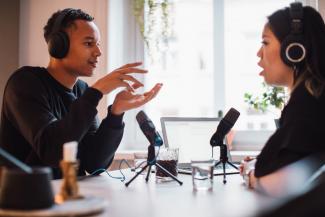
Do the preparation task first. Then listen to the audio and do the exercises.
Preparation
Transcript
Presenter: So, today's expert teacher is Gabriella, a university English teacher from Leeds. Gabriella, hi and thanks for joining us today.
Gabriella: Thanks for having me!
Presenter: So, I have to confess today's topic is something I am really bad at: listening. Most people say speaking is the most stressful part of learning a new language but, for me, with my B1 German, speaking isn't so bad. At least I'm in control of it. But listening … woah … people speak so fast and it's like my brain just shuts down. Am I just really strange and bad at listening? Tell me, honestly, I can take it.
Gabriella: No, you're not strange. In fact, it's really common. You know, in exams most people do pretty well in speaking compared with listening. Of course, exams are a different situation from real life because in an exam you can't ask for something to be repeated or explained. You usually have just one or maybe two opportunities to listen to the dialogue and then it's gone.
Presenter: Right, but in real life I feel stupid always saying, 'Sorry, can you repeat that, please?', especially if I still don't understand even when they repeat it. And people out there listening, I hope you don't do this – quite often the person just repeats what they said equally as fast and I'm still lost!
Gabriella: They do, don't they? In real life, you've got two strategies. One is to pretend to understand and get out of the conversation as fast as you can.
Presenter: Yep, sounds familiar!
Gabriella: But, obviously that's not going to help if it's a conversation with high stakes. It might have important consequences. I mean, if you're just chatting with a stranger at the bus stop, it doesn't matter. But imagine you're at a government office or a bank, trying to find out what paperwork you need to get your ID or open a bank account. What can you do then?
Presenter: I hope you've got the answer, Gabriella, because I'm coming out in a cold sweat just thinking about either of those situations!
Gabriella: The other strategy is to summarise what they said.
Presenter: But how can you do that if you didn't understand what they said?
Gabriella: Ah, well, you only start the summary, so you might say, in German in your case, 'OK, so the first thing I have to do is …?' and make it a question. Or, for example, 'And which office is that again?' Break it down into smaller questions and the other person will naturally start answering them. That way you're controlling the conversation a bit more.
Presenter: I get you ...




Hello! I'm an English teacher and this audio would be really helpful for my students. I'm new to the website; is there any way I can download this and other audio tracks? Thank you and have a great week!
Hello catlima.21,
To download audio from the site just right-click on the player bar (the grey bar with play, pause etc. buttons). You should see 'download audio' as an option.
One other thing: please post comments as new comments rather than replies to existing comments unless you are directly replying. We try to avoid long threads which make navigation more difficult.
Happy New Year!
Peter
The LearnEnglish Team
Alhamdulellah I improve my lisning skill through the British council and still I will continue my learning journey through the British council
great tip, thanks for the advice
What do you do to help with listening?
I tried to listen first to the voices/podcasts here without reviewing the classes provided by the British Council website on the IELTS Ready Premium page, feeling my self lost and unable to understand how to listen to the educational voice effectively. Now, I am more comfortable and relaxed after joining the IELTS Ready Premium Classes of listening that explain all the techniques carefully.
Hi, I'm a college student from indonesia, we use this website a lot to practice English. The website help us at listening comprehension with the audio a lot. What a great website you guys have here.
Usually when I don’t understand someone who speaks in English I explain that I am an outsider and if he can speak more slowly. Then, if I don’t understand again (people always answer the same way), I repeat the same question in other words. If the problem is not solved, I surrender :(
For me I find the listening and speaking are very difficult than reading. Now, I'm B1 so i started with a little bit hard listening،but I'm trying to get it.